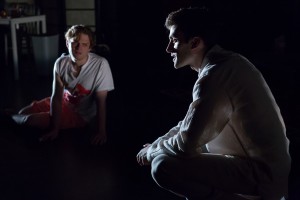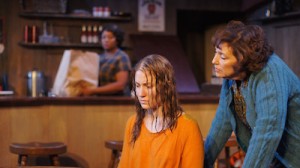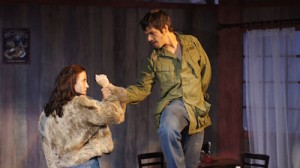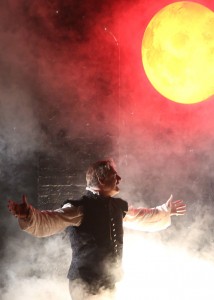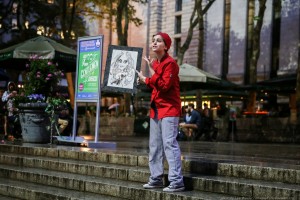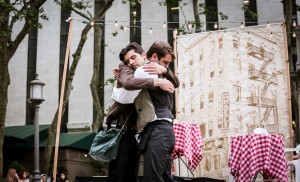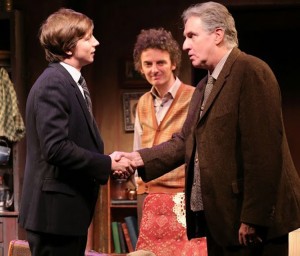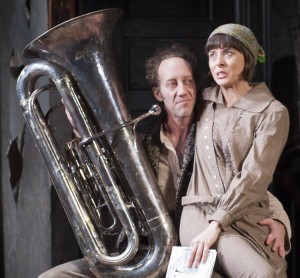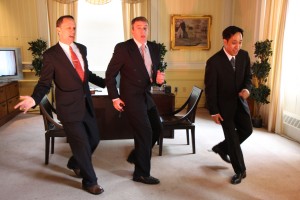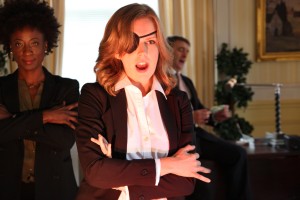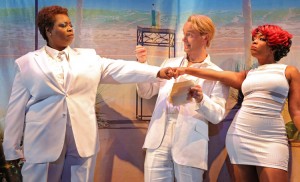Of the three plays open to critics at the Ice Factory Festival this summer, Losing Tom Pecinka, staged at the New Ohio Theatre by Morgan Gould & Friends, is most given to playfulness. Even with the story’s grey backdrop of Tom's death (an immediately evident plot point), writer and director Morgan Gould is more intent on good-humored self-mockery. But even with the occasional laugh that this meta-humor elicits, Losing Tom Pecinka struggles to elevate its story, and regularly defuses its own comedic fireworks.
The story surrounds the event of the eponymous character’s passing, and the destructive attempts of his friends in coping with it. The character Tom Pecinka (whose ghost and flashback-version is played by Zack Segel) is named after a real-life founder of Morgan Gould & Friends, and we assume that the title is a play on the actual Pecinka’s move to the Yale School of Drama. Janice (Tommy Heleringer, pretty in a dress) is a guilt-ridden ex-girlfriend, constantly at odds with Kai (Christopher Geary), Tom’s bitter best friend. Ryan Pecinka (Amir Wachterman), brother of the deceased and funniest of the lot, suffers silently in his love for Janice.
Wachterman is the undeniable talent of the show, straining laughter from even the most confused situations. His fairly ingenious dress-up as a sweaty tennis player, complete with a white sweater tied around his shoulders, making love-stricken speeches to Heleringer’s Janice makes for an uproarious incongruity. Heleringer himself is a shrill delight, making do with Janice’s oftentimes puzzling situational comedy to great effect. The entire cast bubbles with an underlying humorous energy, but their fractured dialogue and the intractable intent of Gould to exercise her didacticism, crowd out any real comedy. The plot is threadlike at best; Gould focuses more on unveiling her satiric takes on comedic tropes and stereotypes she has found in theater.
Indeed, the point Gould tries to make is that theater, and entertainment in general, has fallen into dreary, acceptable routines. These are routines from which her audiences need to be jolted out of; hence her lackadaisical attitude towards public relations (as evidenced by the production's promo). But the primary fault of Losing Tom Pecinka resides in its stubborn insistence on such satire. A heated discussion between Ryan and Janice, which held some potential for good drama, devolved into a satirical scientific run-on, the kind Christopher Nolan or Steven Spielberg would be proud of.
Even these scenes struggle to take off. We are left wondering whether the ghostly Tom that appears to Kai after his death is a comedic poke at depictions of the afterlife in traditional theater (perhaps Hamlet’s ghost?) or a product of Kai’s dramatic, psychological breakdown. It is only at the very end of Losing Tom Pecinka that we finally understand Gould’s directorial intent. Since the plot is a bare canvas, only present to hold the entire production together, the ending loses its finality and importance. Even after a seeming resolution to the play (all the characters huddle around Tom's grave in nostalgic remembrance), they all abruptly break into song, in an ineffable attempt at satirizing the musical.
There are moments of real hilarity, however. The ending is a particular delight to watch, since we are now certain that they’ve been making fun of our seriousness all along. Pregnant pauses and audience interactions with the cast produce considerable audience laughter, especially towards the end. Abrupt changes in time and place heftily undercut the sometimes-awkward interactions between actors, and keep us curiously waiting for the next scene. The sexual tension between Heleringer’s Janice and Wachterman’s Pecinka is palpable, but never serious. Even the eponymous character’s death is rendered comical, somehow. Yet, a willful need to jerk its audience out of its seated stupor and be “not boring” makes Losing Tom Pecinka a parody of itself: to be new and exciting might not be so interesting after all.
Losing Tom Pecinka ran from July 8-11 at the New Ohio Theatre (154 Christopher St., #1E) in Manhattan. For more information, visit http://www.NewOhioTheatre.org.







